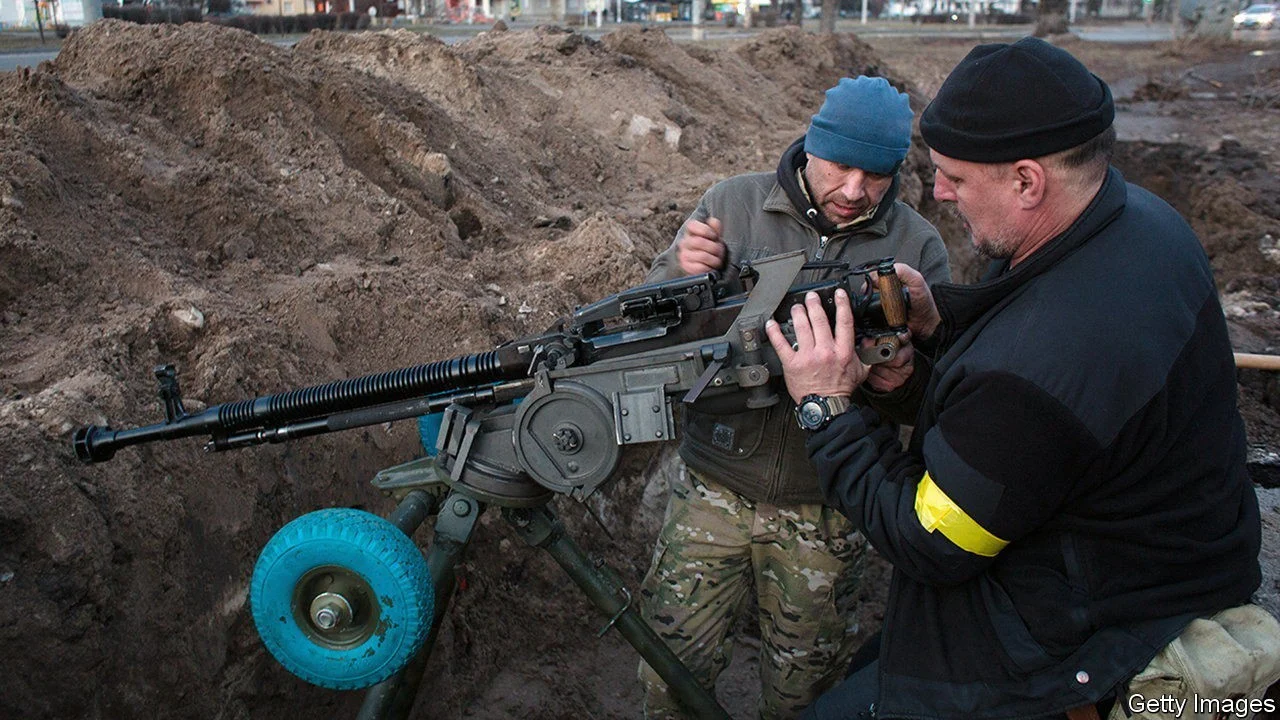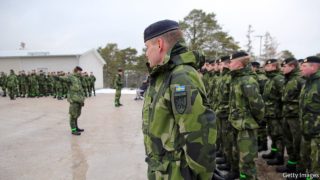
KYIV — THE WARNINGS began early on the morning of February 25th. Russian special forces were in Kyiv, the authorities said, and they were trying to seize power. Some of the visitors might even have acquired Ukrainian military vehicles; others could be pretending to be international observers. In Podil, a historic neighbourhood in the centre of the city, where the sound of church bells was periodically interrupted by explosions and gunfire, Ukrainian forces opened fire on two military vehicles believed to be Russian. Whether they were the enemy or not is debatable. The bullet-pierced windows and the pools of blood were not.
As the day thundered on, officials increased the alarm. By lunchtime Vitaly Klitschko, the mayor of the city, declared that Kyiv was moving into a new, defensive phase. The ministry of defence called on residents to stop Russian tanks with Molotov cocktails. In parts of the city, trucks were seen handing out rifles to anyone who would take them. Petro Poroshenko, a former president, gave interviews with a Kalashnikov in hand, surrounded by a dozen soldiers with machine guns and British-Swedish made nlaw anti-tank weapons.
This is a real war, and the whole of the city is on edge. The fiercest fighting has been concentrated in eastern and northern districts, where Ukrainian forces were able to stop Russian tank advances, though only after retreating and destroying three bridges. In the northern suburb of Obolon, life for all but the bravest has been driven underground. Kristina Berdynskikh, a prominent Ukrainian journalist, is one of hundreds who have made the local metro station her home. Those who have hunkered down with her are cold, sad and anxious.
Intensifying street battles saw the metro station fill to capacity. At one point, staff had to close the doors; they shepherded people to stops further down the line. Ms Berdynskikh saw one man rush in with his young son. They had witnessed heavy fighting as Ukrainian forces battled Russian armoured vehicles. As Ms Berdynskikh reported: “We talked about the best way of getting to Poland.”
Olena, a 32-year-old photographer, explained that she had moved to her boyfriend’s flat on February 24th, thinking his district was safer than Obolon. The next morning a huge explosion blew in their front windows, sending shards of glass flying across the room. They were lucky. Flats on lower storeys of the block were destroyed. The explosion, in which no one was killed, was probably caused by part of a Russian missile that had been intercepted by Ukrainian forces. Another such interception was captured in dramatic film footage that circulated widely on social media.
“It was horrible,” Olena said. “I can’t believe what is happening.” Friends are moving out of Kyiv, but she is determined to stay. Her defiance is not shared by everyone in the building. Maxim, an 18-year-old student whose home was destroyed, said that about half the block’s residents blamed the Russians for what was happening and half blamed their own government. The authorities should accept the demands of Vladimir Putin, Russia’s president, he argues: “Putin is a God. He is a very strong politician.”
In the city centre the streets are eerily deserted. Supermarkets and pharmacies, which had remained open on the first day of the war, have closed. The areas nearest to government buildings have been heavily fortified. Anti-aircraft systems stand opposite the presidential administration building, where President Volodymyr Zelensky is reported to be hunkering down in a deep bunker. Mr Zelensky has declared himself to be the main target for the Russian armed forces, and has vowed not to leave. The intensifying fight for the capital suggests he is right. Western intelligence assessments have long suggested that Russian forces will seek the “decapitation” of the government and the installation of a puppet regime.
Many feared that Mr Zelensky, a former comedian and political novice, would prove unsuited to the task of defending a country under attack. But the charismatic president has cast himself on social media as a gritty and determined wartime leader. A selfie video posted to Facebook on February 25th shows him in Kyiv with his team huddled behind him. The message—“We are here, we are defending Ukraine”—dispelled any notion that his government might be on the run.
Mr Putin was doubtless promised a short war by his generals; he has failed to achieve a lightning one. His elite paratroopers appear to be faltering in their attempt to take the Antonov airstrip in Hostomel, 10km from Kyiv’s northern suburbs. Control of it has shifted back and forth, and the landing strip has been badly damaged, making its use as a staging post for an airborne assault on central Kyiv difficult.
Andriy Zagorodnyuk, who as Ukraine’s defence minister in 2019-20 was responsible for plans to defend the capital, says urban warfare offers no guarantees for Mr Putin. The city contains all kinds of hiding places for portable anti-tank weapons, he notes. But the Russian leader’s biggest error, he argues, was in his assessment of ordinary Ukrainians: “He will face severe resistance as nobody in Kyiv supports the invasion.” Mr Putin looked frustrated on February 25th as he called on Ukrainian soldiers to complete his task themselves. “Take power into your own hands!” he said. In a way, that is what they have been doing.
By The Economist




